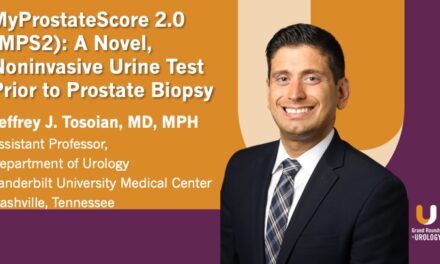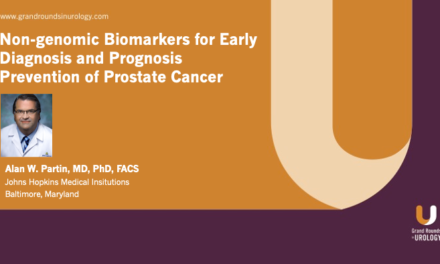Daniel W. Lin, MD presented “The Future of Genomic Markers and DNA Sequencing in Prostate Cancer” during the 19th Annual Future Directions in Urology Symposium on August 11, 2018 in Colorado Springs, Colorado.
How to cite: Lin, Daniel W. “The Future of Genomic Markers and DNA Sequencing in Prostate Cancer” August 11, 2018. Accessed [date today]. https://grandroundsinurology.com/the-future-of-genomic-markers-and-dna-sequencing-in-prostate-cancer/
You can also view Dr. Lin’s full presentation, “Nocturia: Symptom or Disease?“
The Future of Genomic Markers and DNA Sequencing in Prostate Cancer – Summary
Daniel W. Lin, MD, discusses the future genomic markers and DNA sequencing in prostate cancer management. He explains DNA sequencing can improve cure rates when applied to advanced prostate cancer patients.
The State of Genomic Markers and DNA Sequencing in Prostate Cancer
While Prolaris, Oncotype DX, and Decipher are commercially available tests well-integrated into urology for assessing prostate cancer during many stages in the disease course, developments in genomics for prostate cancer are behind relative to other cancer types. For example, estrogen receptor and HER2 markers, as well as other commercial markers, are available for breast cancer.
However, there should be a focus on DNA sequencing in prostate cancer management, as well as the management of other malignancies, in the future.
Germline and Tumor Sequencing
DNA sequencing involves not only assessing tumors, but also sequencing a patient’s blood for inherited germline genetic risks. For instance, about 12% to 15% of metastatic prostate cancer patients who have undergone DNA sequencing have DNA damaging mutations. These patients are much more sensitive to platinum-containing agents than patients without mutations. DNA sequencing can therefore change the way physicians treat patients, influence the treatment of patients’ relatives, and ultimately improve cure rates in advanced prostate cancer
About Dr. Lin
Dr. Lin is a urologist at the University of Washington and the Fred Hutchinson Cancer Research Center in Seattle, Washington. His major basic and translational research interests are in molecular and genomic biomarkers for aggressive prostate cancer.
About the Future Directions in Urology Symposium
The Future Directions in Urology Symposium (FDUS) is an annual collaborative meeting with a faculty consisting of the top researchers, physicians, and educators in the field of urology. During FDUS, experts provide updates on recent developments and debate innovative management approaches in genitourinary cancers and urologic conditions. Subsequently, the experts devise consensus statements in accordance with the discussions held in the meeting.
In this video, Dr. Lin discloses the thesis of the discussion he led during FDUS.
ABOUT THE AUTHOR
Dr. Lin is the Pritt Family Endowed Chair for Prostate Cancer Research and Professor and Chief of Urologic Oncology in the Department of Urology at the University of Washington School of Medicine in Seattle. He is also a urologist at the University of Washington Medical Center and the Seattle Cancer Care Alliance. He received his medical degree at Vanderbilt University Medical Center in Nashville, Tennessee, pursued a Fellowship in Urologic Oncology at Memorial Sloan-Kettering Cancer Center in New York City, and completed his internship and residency at the University of Washington School of Medicine. He serves on the National Comprehensive Cancer Network Guideline Panel for Renal and Testis Tumors, the Society of Urologic Oncology Executive Board, and the AUA Guideline Committees for Advanced Prostate Cancer and Renal Mass Follow-Up. Dr. Lin’s research interests include prostate chemoprevention and carcinogenesis, and his clinical research efforts are in active surveillance of prostate cancer and management of high-risk prostate cancer.




